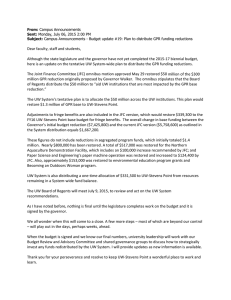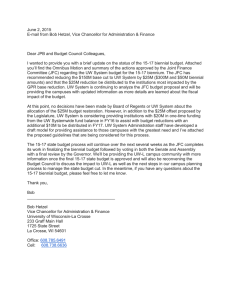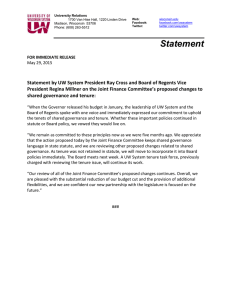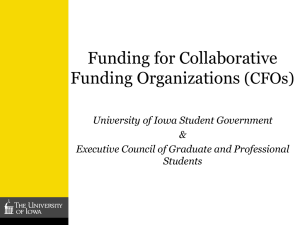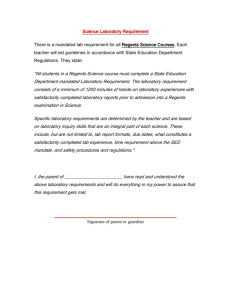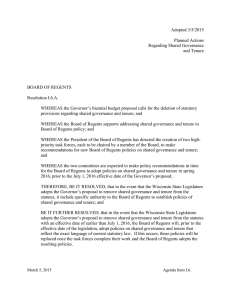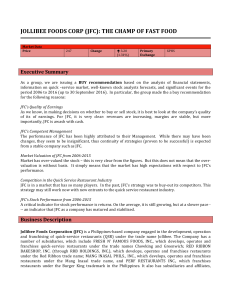June 8, 2015 E-mail from Chancellor Joe Gow Dear colleagues and students:
advertisement
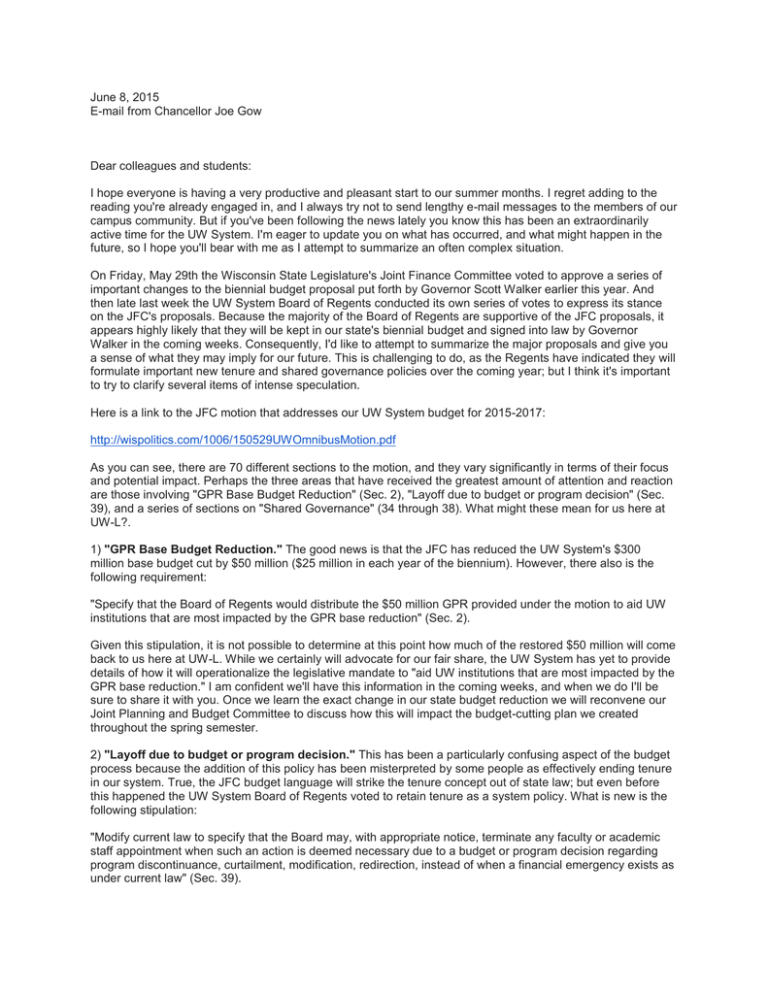
June 8, 2015 E-mail from Chancellor Joe Gow Dear colleagues and students: I hope everyone is having a very productive and pleasant start to our summer months. I regret adding to the reading you're already engaged in, and I always try not to send lengthy e-mail messages to the members of our campus community. But if you've been following the news lately you know this has been an extraordinarily active time for the UW System. I'm eager to update you on what has occurred, and what might happen in the future, so I hope you'll bear with me as I attempt to summarize an often complex situation. On Friday, May 29th the Wisconsin State Legislature's Joint Finance Committee voted to approve a series of important changes to the biennial budget proposal put forth by Governor Scott Walker earlier this year. And then late last week the UW System Board of Regents conducted its own series of votes to express its stance on the JFC's proposals. Because the majority of the Board of Regents are supportive of the JFC proposals, it appears highly likely that they will be kept in our state's biennial budget and signed into law by Governor Walker in the coming weeks. Consequently, I'd like to attempt to summarize the major proposals and give you a sense of what they may imply for our future. This is challenging to do, as the Regents have indicated they will formulate important new tenure and shared governance policies over the coming year; but I think it's important to try to clarify several items of intense speculation. Here is a link to the JFC motion that addresses our UW System budget for 2015-2017: http://wispolitics.com/1006/150529UWOmnibusMotion.pdf As you can see, there are 70 different sections to the motion, and they vary significantly in terms of their focus and potential impact. Perhaps the three areas that have received the greatest amount of attention and reaction are those involving "GPR Base Budget Reduction" (Sec. 2), "Layoff due to budget or program decision" (Sec. 39), and a series of sections on "Shared Governance" (34 through 38). What might these mean for us here at UW-L?. 1) "GPR Base Budget Reduction." The good news is that the JFC has reduced the UW System's $300 million base budget cut by $50 million ($25 million in each year of the biennium). However, there also is the following requirement: "Specify that the Board of Regents would distribute the $50 million GPR provided under the motion to aid UW institutions that are most impacted by the GPR base reduction" (Sec. 2). Given this stipulation, it is not possible to determine at this point how much of the restored $50 million will come back to us here at UW-L. While we certainly will advocate for our fair share, the UW System has yet to provide details of how it will operationalize the legislative mandate to "aid UW institutions that are most impacted by the GPR base reduction." I am confident we'll have this information in the coming weeks, and when we do I'll be sure to share it with you. Once we learn the exact change in our state budget reduction we will reconvene our Joint Planning and Budget Committee to discuss how this will impact the budget-cutting plan we created throughout the spring semester. 2) "Layoff due to budget or program decision." This has been a particularly confusing aspect of the budget process because the addition of this policy has been misterpreted by some people as effectively ending tenure in our system. True, the JFC budget language will strike the tenure concept out of state law; but even before this happened the UW System Board of Regents voted to retain tenure as a system policy. What is new is the following stipulation: "Modify current law to specify that the Board may, with appropriate notice, terminate any faculty or academic staff appointment when such an action is deemed necessary due to a budget or program decision regarding program discontinuance, curtailment, modification, redirection, instead of when a financial emergency exists as under current law" (Sec. 39). True, this is a significant change; yet in the budget motion it approved the JFC was careful to retain the bedrock free speech and expression protections of tenure by stating explicitly that under the new policy it remains improper to layoff tenured faculty based on factors including the following: "conduct, expressions, or beliefs on the faculty member's part which are constitutionally protected, or protected by principles of academic freedom" (Sec. 39). In order to reassure skeptics of the new layoff policy, then, it is vitally important for the Board of Regents to formulate specific policies regarding "program discontinuance, curtailment, modification, redirection"—in particular, how and by whom these situations are to be defined. This will ensure that the new layoff language cannot be used as a pretext for limiting free speech and inquiry on UW System campuses. I'm pleased to say that UW System President Ray Cross has already begun leading this policy formulation process and as we know more about it I'll be sure to share the details. In addition to being chancellor of UW-L, I'm proud to say that I'm a tenured professor of Communication Studies; and just like my colleagues I want to retain my full rights to freedom of speech and inquiry in my teaching and scholarship. 3) "Shared Governance." This aspect of the budget language is not at all ambiguous, as the JFC version of the budget states clearly: "Specify that, with regard to the responsibilities of the faculty, academic staff, and students of each institution, 'subject to' means 'subordinate to'" (Sec. 38). This is a direct reference to the 1994 "Spoto v. Board of Regents" decision https://drive.google.com/a/uwlax.edu/file/d/0B_f2Et1cbWUAWXd4MURuVjhJaUk/view in which the Court found the following: "In order to give the shared governance concept full effect, the term 'subject to' may not be defined as an equivalent to 'subordinate to'" (p. 15). Frankly, in attempting to update the Spoto decision I would have preferred the JFC to say something like "subject to" does not mean "equivalent to," as this would have acknowledged the importance of continued consultation and collaboration with a range of constituencies on UW campuses. But legal language is often blunt, and the JFC appears to want to reverse existing case law. What will be the impact of this change? While I would hope UW System chancellors continue to consult and collaborate with faculty, staff and students regarding key institutional decisions, there is no denying the language the JFC approved creates the potential for shared governance to work differently than it has in the past on UW campuses. I say "potential" because my administrative leadership team colleagues and I have always greatly valued collaborating with the members of our campus community, and I think that the institutional decisions we all have made together (in particular, implementing our "Growth, Quality and Access" differential tuition program, deciding which new facilities to build and how they should be designed, and creating a series of budget reduction plans necessitated by ongoing cuts in state support) are compelling evidence of the power of true shared governance. So, regardless of what the new law might allow, we will not cut faculty, staff or students out of future decision-making at UW-L. Your voices and ideas are essential to a healthy future for our institution. Early on in my administrative career I encountered the following poem written by the philosopher Lao Tzu some 3,000 years ago: "Learn from the people Plan with the people Begin with what they have Build on what they know Of the best leaders When the task is accomplished The people all remark We have done it ourselves" I've found this perspective to be so inspiring that I've printed the words on a card that I cary with me wherever I go. I'm looking at it right now, and if I didn't truly believe these ideas I wouldn't be writing to you. A budget bill isn't going to change our institutional values. Thanks for your patience with my long note, and for hanging in there as the state's lengthy budget process continues to unfold. I know there will be people who will not agree with my analysis of that process, but what I've presented here is what seems to me to be most likely to happen in the future. There is always the possibility that things might turn out differently. But I have no doubt about how very privileged I am to continue creating UW-L's future with all of you! Best wishes, Joe Joe Gow, Chancellor University of Wisconsin-La Crosse

